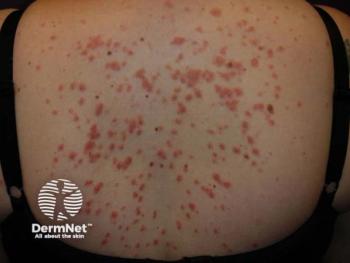
- Dermatology Times, Psoriasis Supplement, August 2021 (Vol. 42, Supp. 02)
- Volume 42
- Issue 2
Patients Share Experience with Dietary Interventions, Supplement Use
Holistic options for disease management show improvement in mild psoriasis.
In results from a survey of 270 patients with psoriasis, more than half had tried 1 to 4 dietary interventions or supplements to treat symptoms. Many found that specific diets, such as the ketogenic diet, and supplements, including probiotics, helped, according to data presented at the 2021 Society for Investigative Dermatology (SID) Virtual Annual Meeting in May.1
“We often field questions about diet and supplements in our clinic, not just related to psoriasis but related to a lot of dermatologic entities,” said senior study author Jennifer G. Powers, MD, a clinical associate professor of dermatology at the University of Iowa Hospitals and Clinics in Iowa City.
Understanding patients’ dietary habits is particularly important when treating patients with psoriasis because they are known to have a higher body mass index (BMI) and are more likely to have metabolic syndrome than the general population.2
“We thought it would be particularly interesting to understand what [patients with] psoriasis are doing to work on their psoriasis from a nutritional standpoint, and what they feel has actually helped them,” Powers said.
Powers and her colleagues from Saint Louis University School of Medicine reported on patients’ responses to a 30-question survey assessing the popularity of specific dietary regimens and common supplements.
Dietary Interventions
The investigators found that of the 270 patients responding, approximately 30% had tried to lose weight. Additionally, more than one-third of those attempting to lose weight said it had a positive impact on psoriasis severity.
Powers said this finding corresponds to what she sees anecdotally in the clinic. Patients with psoriasis who lose weight or make certain dietary adjustments sometimes see changes in their skin. But without a study to confirm that weight loss is the cause of skin improvement, it is hard to draw any conclusions.
“What is nice about this study is we were powered enough to make some summary statements about what happens more globally,” she said. “At least we were able to dip our toes in and try to understand what patients are doing and what they actually feel is helping.”
Among those who endorsed weight loss interventions, 50% said their psoriasis improved with a ketogenic diet. Forty-six percent reported benefiting from the Mediterranean diet, 40% from a vegetarian diet, and 36% from a gluten-free diet.
Supplements: What Worked Best?
Thirty-two percent of respondents had tried supplementing with oral vitamin D, making it the most tried supplement in the study. More than a quarter of patients with psoriasis had tried oral fish oil, followed by 21% who had tried probiotics.
The largest percentage of patients endorsed the least tried supplement, probiotics, with 29% reporting that it had helped their psoriasis. Nearly 28% of those taking vitamin D said it helped and nearly 26% of patients taking fish oil gave it a thumbs-up.
Which Patients Were More Likely to Try These Interventions?
The investigators found that patients with psoriasis who were 55 years and younger were more likely to try diets and supplements than older patients. The survey also revealed that patients with 2 or more psoriasis subtypes, including plaque, guttate, flexural, scalp, or nail, tried more diets or supplements.
Additionally, as other studies have shown, patients with a BMI above 30 were more likely to have moderate to severe disease. Although 5.9% of patients (16) had tried 5 or more diets or supplements, approximately 42% of those surveyed had not tried any diets or supplements.
Putting the Data into Perspective
A supplement or a dietary intervention rarely offers the efficacy of a drug such as adalimumab (Humira; AbbVie), Powers said. However, patients tend to find the adverse effect profile of a diet or supplement more favorable than that of a biologic or other prescription medication, she noted.
“We have a lot of great drugs, so we don’t necessarily need these types of interventions most of the time, but if a patient has very mild disease or if they are looking to improve a little bit we wonder if these could contribute to the overall improvement,” Powers said.
As the majority of patients studied had tried at least 1 diet or supplement—and many had tried several—dermatologists should consider a patient’s willingness to use these types of treatment options.
“Our research gives dermatologists a jumping off point for discussing these other interventions. Now dermatologists know which supplements and dietary interventions might be on patients’ radar,” Powers said, “but we need more data about whether or not these dietary interventions and supplements could be used in the future as part of treatment.”
Disclosures:
Powers reported no financial interest or conflicts of interest.
References:
1. Dhinsa H, Wu N, Chaudhry S, Powers JG. Diet and nutritional behaviors of patients with Psoriasis. Abstract presented at: 2021 SID Virtual Annual Meeting; May 3-8, 2021. July 15, 2021. Abstract LB741.
2. Gisondi P, Fostini AC, Fossà I, Girolomoni G, Targher G. Psoriasis and the metabolic syndrome. Clin Dermatol. 2018;36(1):21-28. doi:10.1016/j.clindermatol.2017.09
Articles in this issue
over 4 years ago
Find the Difference: Drug-Related Psoriasisover 4 years ago
French Results Echo Expert Findingsover 4 years ago
PeDRA Lists Systemics With Higher COVID-19 Riskover 4 years ago
Studies of Commonly Used Supplements for Psoriasisover 4 years ago
3 Dietary Considerations for Psoriasisover 4 years ago
Transform Pandemic Lessons Into Actionable Care Plansover 4 years ago
Psoriasis, Metabolic Syndrome Connection ExpandsNewsletter
Like what you’re reading? Subscribe to Dermatology Times for weekly updates on therapies, innovations, and real-world practice tips.










